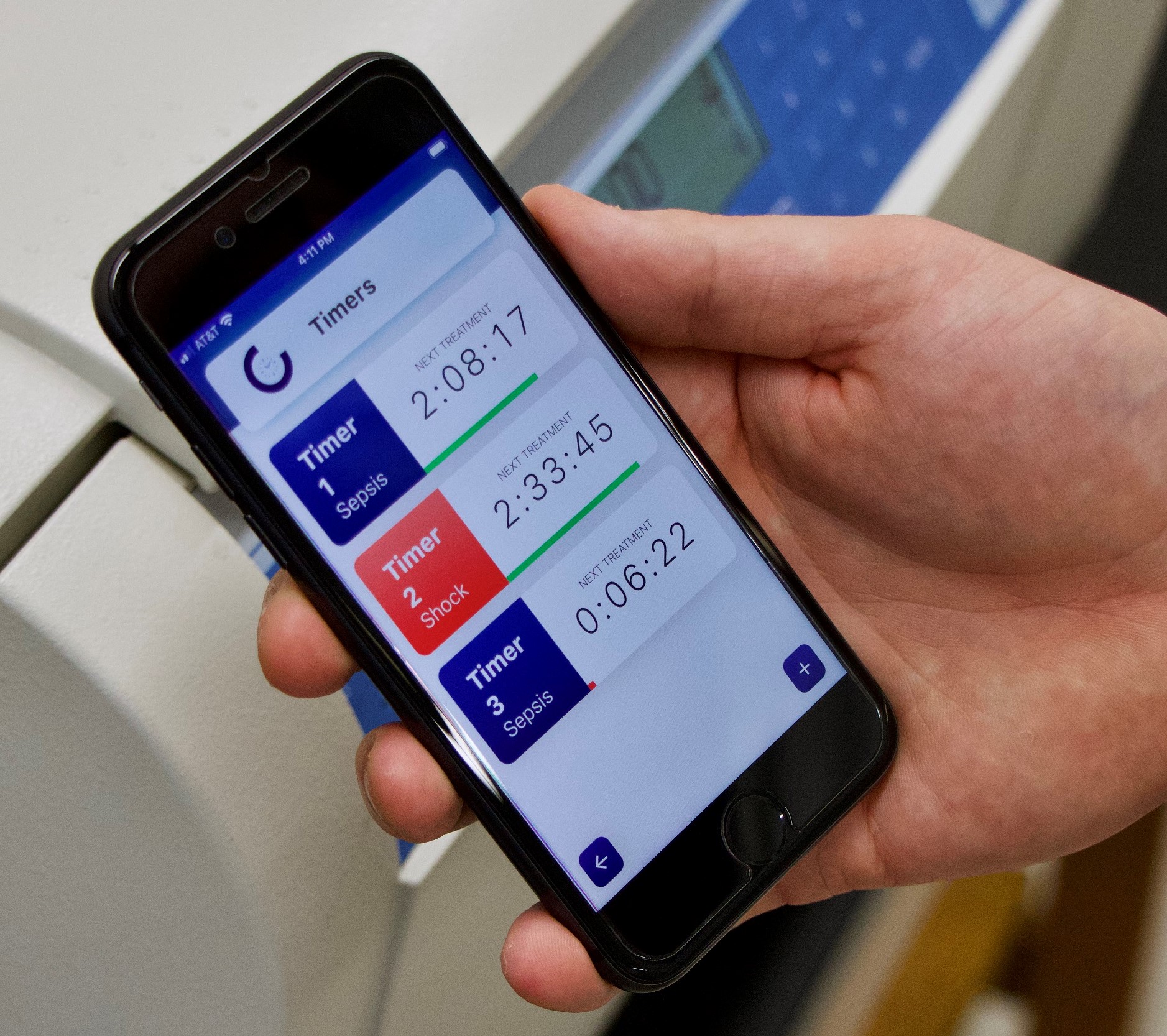Rowan students’ sepsis app advances to real-world testing
Rowan students’ sepsis app advances to real-world testing

As the leading cause of death in U.S. hospitals, sepsis can escalate rapidly. It occurs when the body’s immune system begins to fight itself as it fends off infection. Without prompt treatment, the condition can shut down organs, damage tissue and result in death.
In a swamped emergency department, it can be challenging for health care teams to track time and symptoms, so they can meet the sequence of established assessment and treatment protocols.
A new app designed by Rowan University students to help providers is undergoing real-world testing at Virtua Our Lady of Lourdes Hospital in Camden, N.J. 
“The data shows that for every hour we delay treatment for sepsis, the mortality rate increases by 8%. Making sure we’re treating these patients in a timely manner is key to their survival,” said Virtua’s Debra Gillen, DNP, director of outcomes for neuroscience. “This app allows the treatment team to not only capture when they’re doing the treatment, but it also alerts them when the next step is needed.”
Work on the project began when Alan Pope, MD, chief medical officer at Virtua Our Lady of Lourdes Hospital, presented the problem to Mark Byrne, Ph.D., biomedical engineering professor and founding head of the Biomedical Engineering Department of the Henry M. Rowan College of Engineering. That led to a hands-on project for undergraduate students.
“Our department’s mission is to create solutions to pressing issues in health care,” Byrne said. “We are quickly becoming a national leader, working with clinical partners and biomedical companies, as well as creating new companies. We engage our faculty, graduate, and undergraduate students, working alongside our partners to jointly develop solutions that can be immediately impactful to patients.”
Guided by Erik Brewer, Ph.D., chair of Innovation & External Partnerships and lecturer in the Biomedical Engineering Department, a team of Rowan students met with Virtua health care professionals to discuss their needs.
“They came up with a very interesting app that people can put on their phone, desktop or iPad that meets all the standard of care that is expected,” Pope said. “It has a timer function and provides alerts to clinicians, so we’re sure interventions are performed in a timely fashion and there are no gaps in care.”
Sam Mardini, a finance major from Clinton Township, leads the interdisciplinary student team that developed and refined the app. Mardini founded medical startup ChronoCare along with co-founders Augustino Scorzo (Biomedical Engineering), Christopher Contos (Electrical and Computer Engineering), Liam Cutri-French (Civil Engineering), and Matt Cangemi (Finance).
The team added contracted employees from Rowan and Drexel University, including fellow senior Tom Schofield (Electrical and Computer Engineering). Past biomedical engineering graduates Rob DePersia, Ashley Plunkett and Miguel Isaga started the project and worked on early designs.
Virtua Our Lady of Lourdes Hospital medical staff look forward to testing the app soon in the emergency department and critical care units.
“You want to implement interventions as soon as you can in a stepwise fashion,” said Jamie Bricker, BSN, stroke coordinator at Virtua. “We’re in a culture when we’re trying to use technology to our best advantage. Having this application work on our behalf to serve as a reminder and time tracker could prove advantageous.”
Gillen anticipates that by improving the timeliness and completeness of care, the app will decrease mortality rates and improve patients’ quality of life.
“Sepsis has a long-term impact on patients, not just the immediate,” Gillen said. “The more quickly and more appropriately we treat these patients, the more likely the patient will not progress to septic shock.”
Mardini credited assets such as Rowan’s interdisciplinary engineering clinic program, the entrepreneurship program of the Rohrer College of Business and extensive input from health care professionals including Christa Schorr, DNP, associate professor of medicine at Cooper Medical School at Rowan University.
“I don’t know if the app could have happened without the very unique set of opportunities at Rowan,” Mardini said. “Straddling between biomedical engineering and business, I was in a unique position to take advantage of all of Rowan’s resources.”
The ChronoCare team also is building an analytics dashboard to expand the scope of the product within sepsis and may look at ways the software can be applied to other health conditions.
“The goal is that after this testing we can seek more funding to lean into development of all those areas,” Mardini said.